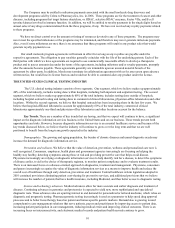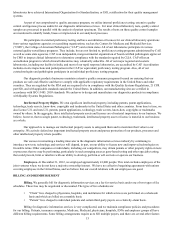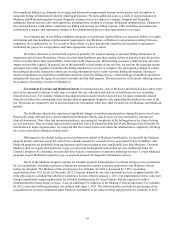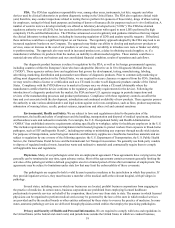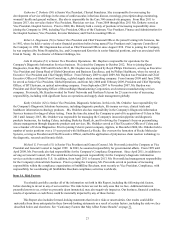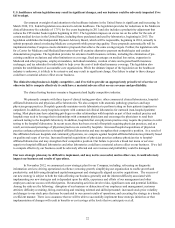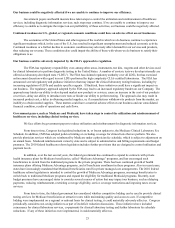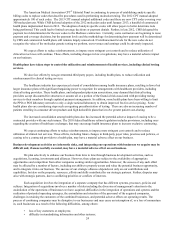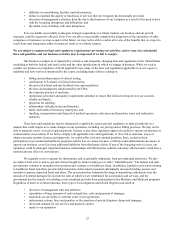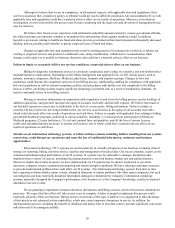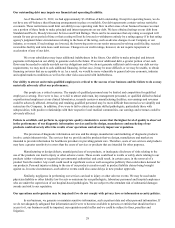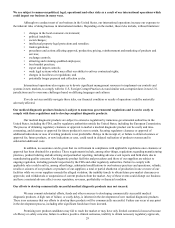Quest Diagnostics 2012 Annual Report Download - page 22
Download and view the complete annual report
Please find page 22 of the 2012 Quest Diagnostics annual report below. You can navigate through the pages in the report by either clicking on the pages listed below, or by using the keyword search tool below to find specific information within the annual report.19
including the European Union, India and Mexico, regarding protecting the security and privacy of certain healthcare and
personal information. These privacy and security laws include the federal Health Insurance Portability and Accountability Act,
as amended, and the regulations thereunder (collectively, “HIPAA”). The HIPAA security regulations establish requirements for
safeguarding protected health information. The HIPAA privacy regulations establish comprehensive federal standards regarding
the uses and disclosures of protected health information. Together, these laws and regulations establish a complex regulatory
framework on a variety of subjects, provide for penalties for non-compliance, and may require a healthcare provider to notify
individuals or the government if the provider discovers certain breaches of unsecured personal or a patient's protected health
information. The regulations were revised in early 2013. We have maintained policies and practices designed to meet
applicable requirements, and plan to update them to address the new regulations.
Drug Testing; Controlled Substances. All U.S. laboratories that perform drug testing for certain public sector
employees and employees of certain federally regulated businesses are required to be certified as meeting the detailed
performance and quality standards of the Substance Abuse and Mental Health Services Administration. To obtain access to
controlled substances used to perform drugs of abuse testing in the United States, laboratories must be licensed by the Drug
Enforcement Administration. All of our laboratories that perform such testing or that utilize controlled substances are so
certified or so licensed, respectively.
Compliance. We seek to conduct our business in compliance with all applicable laws and regulations. Many of the
laws and regulations applicable to us, however, including many of those relating to billing, reimbursement of tests and
relationships with physicians and hospitals, are vague or indefinite or have not been interpreted by the courts. They may be
interpreted or applied by a prosecutorial, regulatory or judicial authority in a manner that could require us to make changes in
our operations, including our pricing and/or billing practices. The applicability or interpretation of laws and regulations also
may not be clear in light of emerging changes in clinical testing science and healthcare technology. Such occurrences,
regardless of their outcome, could, among other things:
• increase our operating costs including, but not limited to, those costs associated with providing diagnostic
information services or manufacturing or distributing products, and administrative requirements related to billing;
• decrease the amount of reimbursement related to diagnostic information services performed;
• damage our reputation; and/or
• adversely affect important business relationships with third parties.
If we fail to comply with applicable laws and regulations, we could suffer civil and criminal penalties, fines, exclusion
from participation in governmental healthcare programs and the loss of various licenses, certificates and authorizations
necessary to operate our business, as well as incur additional liabilities from third party claims, all of which could have a
material adverse effect on our business. Certain federal and state statutes, regulations and other laws, including the qui tam
provisions of the federal False Claims Act, allow private individuals to bring lawsuits against healthcare companies on behalf
of government payers, private payers and/or patients alleging inappropriate billing practices.
The federal or state governments may bring claims based on theories as to our current practices that we believe are
lawful. The federal and state governments have substantial leverage in negotiating settlements since the amount of potential
damages far exceeds the rates at which we are reimbursed, and the government has the remedy of excluding a non-compliant
provider from participation in the Medicare and Medicaid programs. Reimbursement from traditional Medicare and Medicaid
programs represented approximately 19% of our net revenues during 2012. We believe that, based on our experience with
settlements and public announcements by various government officials, the federal and state governments continue to
strengthen their enforcement efforts against healthcare fraud. In addition, legislative provisions relating to healthcare fraud and
abuse provide government enforcement personnel substantially increased funding, powers, penalties and remedies to pursue
suspected cases of fraud and abuse.
We have a long-standing and well-established compliance program. The Quality, Safety & Compliance Committee of
our Board of Directors oversees our compliance program and requires periodic management reports regarding our compliance
program. Our program includes detailed policies and procedures and training programs intended to ensure the strict
implementation and observance of all applicable laws, regulations and Company policies. Further, we conduct in-depth reviews
of procedures and facilities to assure regulatory compliance throughout our operations. We conduct annual training of our
employees on these compliance policies and procedures.



